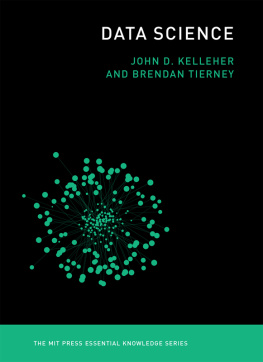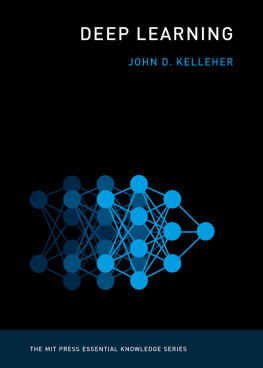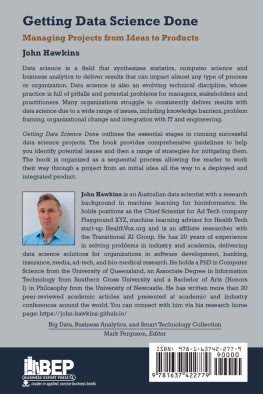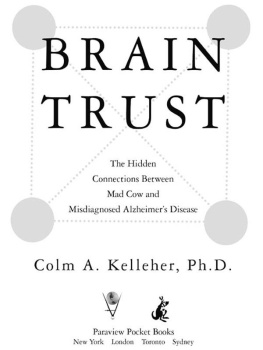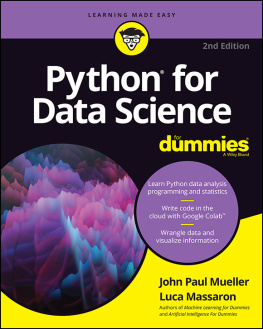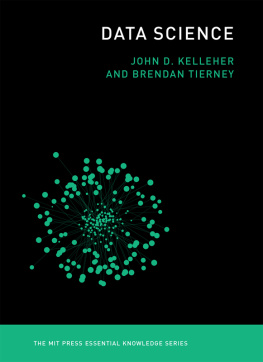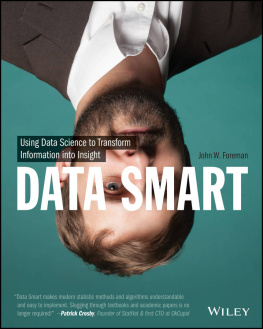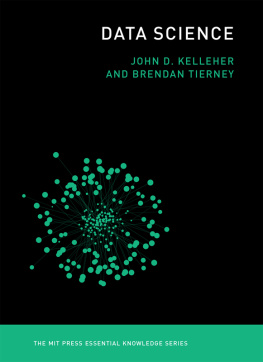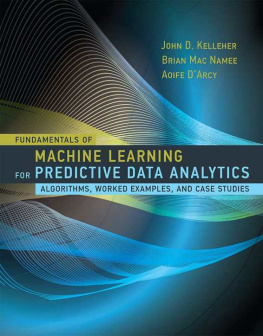John Kelleher - Data Science
Here you can read online John Kelleher - Data Science full text of the book (entire story) in english for free. Download pdf and epub, get meaning, cover and reviews about this ebook. year: 2018, publisher: MIT Press, genre: Business. Description of the work, (preface) as well as reviews are available. Best literature library LitArk.com created for fans of good reading and offers a wide selection of genres:
Romance novel
Science fiction
Adventure
Detective
Science
History
Home and family
Prose
Art
Politics
Computer
Non-fiction
Religion
Business
Children
Humor
Choose a favorite category and find really read worthwhile books. Enjoy immersion in the world of imagination, feel the emotions of the characters or learn something new for yourself, make an fascinating discovery.
- Book:Data Science
- Author:
- Publisher:MIT Press
- Genre:
- Year:2018
- Rating:3 / 5
- Favourites:Add to favourites
- Your mark:
- 60
- 1
- 2
- 3
- 4
- 5
Data Science: summary, description and annotation
We offer to read an annotation, description, summary or preface (depends on what the author of the book "Data Science" wrote himself). If you haven't found the necessary information about the book — write in the comments, we will try to find it.
Data Science — read online for free the complete book (whole text) full work
Below is the text of the book, divided by pages. System saving the place of the last page read, allows you to conveniently read the book "Data Science" online for free, without having to search again every time where you left off. Put a bookmark, and you can go to the page where you finished reading at any time.
Font size:
Interval:
Bookmark:
The MIT Press Essential Knowledge Series
Auctions, Timothy P. Hubbard and Harry J. Paarsch
The Book, Amaranth Borsuk
Cloud Computing, Nayan Ruparelia
Computing: A Concise History, Paul E. Ceruzzi
The Conscious Mind, Zoltan L. Torey
Crowdsourcing, Daren C. Brabham
Data Science, John D. Kelleher and Brendan Tierney
Free Will, Mark Balaguer
The Future, Nick Montfort
Information and Society, Michael Buckland
Information and the Modern Corporation, James W. Cortada
Intellectual Property Strategy, John Palfrey
The Internet of Things, Samuel Greengard
Machine Learning: The New AI, Ethem Alpaydin
Machine Translation, Thierry Poibeau
Memes in Digital Culture, Limor Shifman
Metadata, Jeffrey Pomerantz
The MindBody Problem, Jonathan Westphal
MOOCs, Jonathan Haber
Neuroplasticity, Moheb Costandi
Open Access, Peter Suber
Paradox, Margaret Cuonzo
Post-Truth, Lee McIntyre
Robots, John Jordan
Self-Tracking, Gina Neff and Dawn Nafus
Sustainability, Kent E. Portney
Synesthesia, Richard E. Cytowic
The Technological Singularity, Murray Shanahan
Understanding Beliefs, Nils J. Nilsson
Waves, Frederic Raichlen
John D. Kelleher and Brendan Tierney
The MIT Press
Cambridge, Massachusetts
London, England
2018 Massachusetts Institute of Technology
All rights reserved. No part of this book may be reproduced in any form by any electronic or mechanical means (including photocopying, recording, or information storage and retrieval) without permission in writing from the publisher.
This book was set in Chaparral Pro by Toppan Best-set Premedia Limited. Printed and bound in the United States of America.
Library of Congress Cataloging-in-Publication Data
Names: Kelleher, John D., 1974- author. | Tierney, Brendan, 1970- author.
Title: Data science / John D. Kelleher and Brendan Tierney.
Description: Cambridge, MA : The MIT Press, [2018] | Series: The MIT Press essential knowledge series | Includes bibliographical references and index.
Identifiers: LCCN 2017043665 | ISBN 9780262535434 (pbk. : alk. paper)
eISBN 9780262347013
Subjects: LCSH: Big data. | Machine learning. | Data mining. | Quantitative research.
Classification: LCC QA76.9.B45 K45 2018 | DDC 005.7--dc23 LC record available at https://lccn.loc.gov/2017043665
ePub Version 1.0
d_r0
The MIT Press Essential Knowledge series offers accessible, concise, beautifully produced pocket-size books on topics of current interest. Written by leading thinkers, the books in this series deliver expert overviews of subjects that range from the cultural and the historical to the scientific and the technical.
In todays era of instant information gratification, we have ready access to opinions, rationalizations, and superficial descriptions. Much harder to come by is the foundational knowledge that informs a principled understanding of the world. Essential Knowledge books fill that need. Synthesizing specialized subject matter for nonspecialists and engaging critical topics through fundamentals, each of these compact volumes offers readers a point of access to complex ideas.
Bruce Tidor
Professor of Biological Engineering and Computer Science
Massachusetts Institute of Technology
The goal of data science is to improve decision making by basing decisions on insights extracted from large data sets. As a field of activity, data science encompasses a set of principles, problem definitions, algorithms, and processes for extracting nonobvious and useful patterns from large data sets. It is closely related to the fields of data mining and machine learning, but it is broader in scope. Today, data science drives decision making in nearly all parts of modern societies. Some of the ways that data science may affect your daily life include determining which advertisements are presented to you online; which movies, books, and friend connections are recommended to you; which emails are filtered into your spam folder; what offers you receive when you renew your cell phone service; the cost of your health insurance premium; the sequencing and timing of traffic lights in your area; how the drugs you may need were designed; and which locations in your city the police are targeting.
The growth in use of data science across our societies is driven by the emergence of big data and social media, the speedup in computing power, the massive reduction in the cost of computer memory, and the development of more powerful methods for data analysis and modeling, such as deep learning. Together these factors mean that it has never been easier for organizations to gather, store, and process data. At the same time, these technical innovations and the broader application of data science means that the ethical challenges related to the use of data and individual privacy have never been more pressing. The aim of this book is to provide an introduction to data science that covers the essential elements of the field at a depth that provides a principled understanding of the field.
Chapter 1 introduces the field of data science and provides a brief history of how it has developed and evolved. It also examines why data science is important today and some of the factors that are driving its adoption. The chapter finishes by reviewing and debunking some of the myths associated with data science. Chapter 2 introduces fundamental concepts relating to data. It also describes the standard stages in a data science project: business understanding, data understanding, data preparation, modeling, evaluation, and deployment. Chapter 3 focuses on data infrastructure and the challenges posed by big data and the integration of data from multiple sources. One aspect of a typical data infrastructure that can be challenging is that data in databases and data warehouses often reside on servers different from the servers used for data analysis. As a consequence, when large data sets are handled, a surprisingly large amount of time can be spent moving data between the servers a database or data warehouse are living on and the servers used for data analysis and machine learning. Chapter 3 begins by describing a typical data science infrastructure for an organization and some of the emerging solutions to the challenge of moving large data sets within a data infrastructure, which include the use of in-database machine learning, the use of Hadoop for data storage and processing, and the development of hybrid database systems that seamlessly combine traditional database software and Hadoop-like solutions. The chapter concludes by highlighting some of the challenges in integrating data from across an organization into a unified representation that is suitable for machine learning. Chapter 4 introduces the field of machine learning and explains some of the most popular machine-learning algorithms and models, including neural networks, deep learning, and decision-tree models. Chapter 5 focuses on linking machine-learning expertise with real-world problems by reviewing a range of standard business problems and describing how they can be solved by machine-learning solutions. Chapter 6 reviews the ethical implications of data science, recent developments in data regulation, and some of the new computational approaches to preserving the privacy of individuals within the data science process. Finally, chapter 7 describes some of the areas where data science will have a significant impact in the near future and sets out some of the principles that are important in determining whether a data science project will succeed.
Next pageFont size:
Interval:
Bookmark:
Similar books «Data Science»
Look at similar books to Data Science. We have selected literature similar in name and meaning in the hope of providing readers with more options to find new, interesting, not yet read works.
Discussion, reviews of the book Data Science and just readers' own opinions. Leave your comments, write what you think about the work, its meaning or the main characters. Specify what exactly you liked and what you didn't like, and why you think so.

